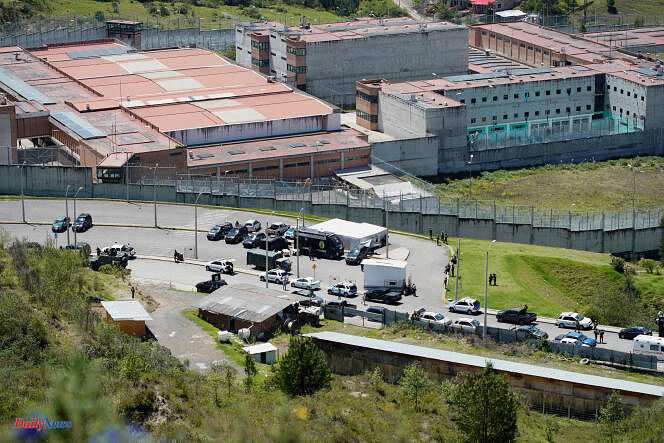The Ecuadorian army and police regained control of several prisons on Sunday January 14 and freed more than 200 prison officials taken hostage. According to General Pablo Velasco, “control has been reestablished in six centers” of detention, and an operation is “under way” in a final prison in the southern province of Cotopaxi. “[There was] no agreement (…), the military intervention was subsequent to the release” of the hostages, said General Velasco.
The nationwide operation, launched hours after the release of 136 guards and other officials taken hostage by the mutineers, returned the country to some normalcy after a week of chaos.
Against the backdrop of the "war", which has opened in recent days between criminal gangs linked to drug trafficking and the security forces, the army has broadcast images showing hundreds of detainees lined up with their hands on their heads, shirtless or undershirts. clothes, held at gunpoint by soldiers. Strictly supervised by the soldiers, the prisoners had to sing the national anthem, in close ranks at the foot of the Ecuadorian flag.
The prison administration (SNAI) announced that “the joint action of the police and the army allowed the release of all the hostages who were held in different prisons in the country”. But, according to the latest press release on Sunday evening, the new toll of released prisoners stands at 201.
The president, Daniel Noboa, welcomed on X the “release” of the hostages and said “continue working to restore peace”.
Images released by police showed the guards, including many women, in tears, exhausted and supported by their colleagues, shortly after their release. “Thank God we all came out okay. We are in good health,” the freed Cotopaxi hostages said in another video on social media, waving an Ecuadorian flag.
For a week, hostages, knives to their throats or guns to their heads, have been calling on the authorities for help and restraint, in videos broadcast on the networks. The SNAI reported on Saturday the death of a guard during clashes with detainees in the province of El Oro (South-West, bordering Peru), bringing the overall toll of a week of terror to nineteen dead. , including civilians, prison guards, police officers and prisoners, according to the latest official report. Throughout these hostage situations, the prison administration gave very few details, with security forces confronting mutinous prisoners in some penitentiaries and playing negotiations in others.
The announcement of the January 7 escape of the feared leader of the Choneros gang, Adolfo Macias, alias "Fito", provoked a wave of mutinies with hostage-taking in at least five prisons, attacks against the forces order and other acts aimed at sowing terror. The president, Daniel Noboa, declared a state of emergency and ordered the army to neutralize these criminal gangs, now considered “terrorist”. More than 22,400 troops were deployed, with land, air and sea patrols, while a curfew was imposed.
Once a haven of peace, the country is given over to the violence of criminal gangs
After a wave of panic throughout Ecuador caused by the live attack on Tuesday on the studios of a public television channel in Guayaquil, the epicenter of drug trafficker violence, the situation has returned to relative normality. This is the case, during the day, in Guayaquil as in Quito, the capital, even if Ecuadorians quickly return to the safety of their homes at the end of the afternoon. Once a haven of peace, Ecuador has in recent years become the shipping center for cocaine produced in its Colombian and Peruvian neighbors.
Drug traffickers have gradually imposed their law in this country, given over to the violence of criminal gangs. Ecuadorian prisons, overcrowded and divided into sections controlled by gangs, are regularly the scene of massacres between these rival gangs: Choneros (“those from Chone”, a town in western Ecuador), Tiguerones (“tigers” ), Lobos (“wolves”) and other Aguilas (“eagles”).
Daniel Noboa, 36, was elected last November as the youngest president in Ecuador's history on the promise of restoring security. His predecessor, the conservative Guillermo Lasso, was confronted with several bouts of violence in prisons and declared a state of emergency more than once, without managing to regain control of the situation and more generally to stem trafficking. drugs, linked to corruption, which is blighting the country.












